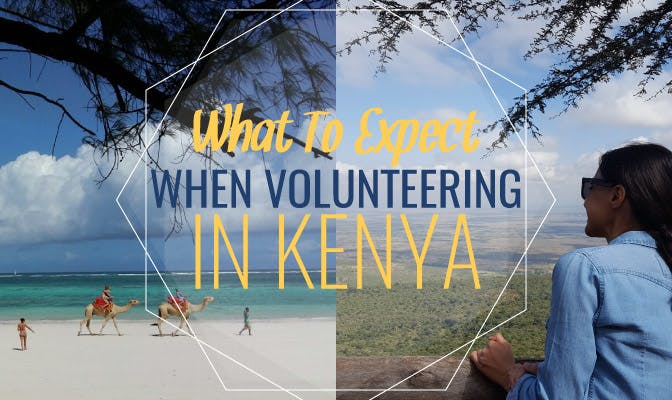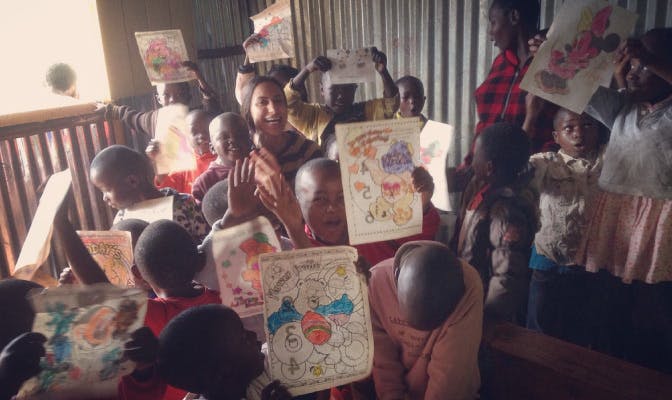
How to volunteer in Kenya? For me it all started on a warm summer evening. I was toying with the idea of volunteering abroad, researching hundreds of projects and countries. Volunteering with children had long been on my bucket list and by the end of the evening I had decided on my destination and project: theIVHQ Kenya volunteer program as a teaching volunteer. Filled with excitement. I was beyond excited in anticipation for what was to come. Little did I know what a life-changing experience laid ahead of me.
Volunteering In Kenya As A Teacher
There are a number of different IVHQ volunteer opportunities in Kenya but I knew my skills would align best with the Teaching project. School runs from Monday to Friday with a 9am start. If you’re assigned a nursery class, the main focus will be teaching the little ones their ABCs, often through song and storytelling, while the older students engage in English, Maths, Social Studies and Science. Kiswahili classes (the local language) are taught by the Kenyan teachers at your school so don’t worry if your language skills are a little rusty (or non-existent!). And if you’ve always wanted to add a new language to your portfolio, here is your golden opportunity! Scootch over next to the kids with a notepad and pencil in tow and start scribbling down words from the blackboard. You’ll be an instant hit with both the teachers and the kids. Although Kiswahili is the official language in Kenya, English is widely spoken amongst children and adults so you won’t have any difficulties communicating with your students nor the teachers at your placement. The schools are equipped with the basics: wooden desks, blackboards and chalk. Textbooks are a scarcity and if you’re lucky you’ll have one textbook per topic per class. Breaks are the perfect time to get to know the kids more so come prepared with games and songs from your home country. The kids are quick to learn (even a song in a foreign language) and love to mix things up with new games.
What will the accommodation and living be like?
Living in Nairobi is an experience on its own with its everyday hustle and bustle. The capital is known as East Africa’s business and cultural hub with lots of sightseeing, outdoor activities and delicious dining. You’ll be placed with a host family in a neighborhood nearby your placement. Most of the time you’ll be close enough to walk to school, if not just a short matatu (bus) ride away. Be prepared to live the cozy life, meaning: sharing a room with 1 to 3 other volunteers in a home that can house up to 6 to 12 people at full capacity. And believe me, you wouldn’t want it any other way. There is no better way to get to know and become best buds with the other volunteers than living shoulder to shoulder with one another. All host homes have electricity (but don’t get surprised by the occasional power outages), however running water is not a guarantee. Don’t worry! Bucket showers are a no-brainer and you’ll be surprised by your ability to quickly adapt to your new living predicaments. My tip: embrace it and immerse yourself into the Kenyan way of life!
Will I like the food?
Traditional Kenyan dishes are prepared by your host mom and enjoyed with your host family and other volunteers. Expect warm mandazis (triangle shaped, doughnut like pastries) with chai (tea and milk) for breakfast, while lunch and dinner meals vary from wholesome ugali (stiff porridge made with maize flour) and spinach, tasty chapati (flat pancake-like bread made with wheat flour and baked on a griddle) and veggie stews or juicy bean and potato pots, to name a few. Kenyans love their meat and when you’re out and about make sure to give it a try but it is relatively expensive and therefore a rarity at the host family’s dinner table.
How can I spend my free time around Nairobi?
Kiss a giraffe at the Giraffe Centre, try authentic Kenyan food at Mama Oliech’s, feed a monkey at the City Park, sip on a cup made of Kenya’s famous coffee beans, hike Mount Longonot and much more - needless to say, you’ll never have a dull moment in Nairobi. The city offers a spread of activities and you won’t have to travel far to plan an unforgettable weekend.
Where should I travel on my weekends?
Kenya is a popular destination for volunteers and rightfully so! It introduces you to some of the most beautiful sceneries on this planet (and that’s no exaggeration!) from the great wildlife safari at Maasai Mara to the pristine beaches off the coast, the quaint lake tours in the outskirts of Naivasha to the breathtaking views on top of Mount Kilimanjaro - Kenya’s got it all!
Things To Keep In Mind When Volunteering In Kenya
Money and ATMs:
Only carry with you enough cash for the day, stay alert and never let your bag out of sight. ATMs are available at all banks and malls. Although it’s generally considered safe, swipe your credit card with caution to avoid any fraudulent activity.
Weather:
Nairobi weather is generally sunny, dry and not too hot for most of the year. The main rainy season starts from March to May and continues throughout October and November but this can shift year to year. The sunniest time of the year is December to March (their summer months) and the cloudiest time is from June to September (their winter months).
WiFi:
WiFi is accessible with cafés, restaurants and malls across the city offering free connectivity.
Clothing:
Nairobi fashion is something straight off the catwalk. Colors are worn in abundance, with patterns left-right-center so don’t hesitate to finally pack that screaming pink dress you bought but never found the courage to wear or those neon yellow pants you never saw fitting for any occasion. Lengthwise, stay considerate and presentable. Skip the skimpy hot pants and barely-there tank tops to be on the safe side.
What is necessary to bring:
- Flashlight
- Durable walking shoes
- Comfortable clothes
- Toilet paper
- Towels
- Universal adaptor
- Power bank
- Wet wipes
- A positive attitude and an open mind!
What to think about before take-off:
Once your program and tickets are booked and confirmed, start talking about your volunteer work to family, friends and community, and set up a crowdfunding site for those who wish to donate. Placements are always in need of support whether it be sponsoring a child through school, expanding school facilities, purchasing school materials.. the list goes on. Reach out to your local newspapers and magazines too! A good cause is always well-received in media. Tapping into public news channels will allow you to connect with a broader audience and as a result boost your chances of more donations. My own fundraising campaign was an instant success raising close to US$5000 in only 6 months, and featured in two popular Dubai magazines: Dubai Week and Emirates Woman. Good luck!
If you are ready to pack your bags and experience Africa in real life then you can find out more about volunteering with IVHQ in Kenya here.






